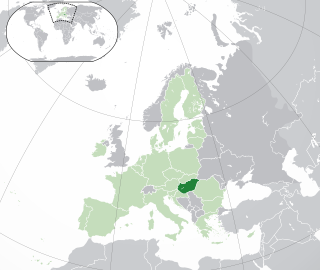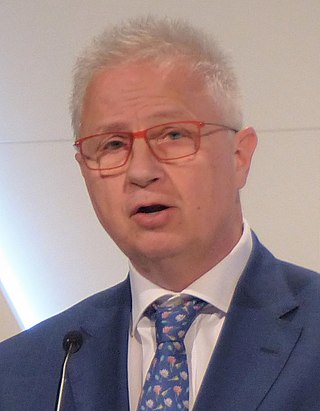The politics of Hungary takes place in a framework of a parliamentary representative democratic republic. The prime minister is the head of government of a pluriform multi-party system, while the president is the head of state and holds a largely ceremonial position. As of 2024, The country is considered "no longer a full democracy" by the EU, and is generally said to have democratically backslid since 2010 when the Fidesz–KDNP Party Alliance led by Viktor Orbán won a two-third parliamentary supermajority and adopted a new constitution of Hungary that have both remained in place since.

Fidesz – Hungarian Civic Alliance is a right-wing populist and national-conservative political party in Hungary led by Viktor Orbán.

Viktor Mihály Orbán is a Hungarian lawyer and politician who has been Prime Minister of Hungary since 2010, previously holding the office from 1998 to 2002. He led the Fidesz political party from 1993-2000 and since 2003.

Lesbian, gay, bisexual, and transgender (LGBTQ) people in Hungary face legal and social challenges not experienced by non-LGBT residents. Homosexuality is legal in Hungary for both men and women. Discrimination on the basis of sexual orientation and sex is banned in the country. However, households headed by same-sex couples are not eligible for all of the same legal rights available to heterosexual married couples. Registered partnership for same-sex couples was legalised in 2009, but same-sex marriage remains banned. The Hungarian government has passed legislation that restricts the civil rights of LGBT Hungarians – such as ending legal recognition of transgender Hungarians and banning LGBT content and displays for minors. This trend continues under the Fidesz government of Viktor Orbán. In June 2021, Hungary passed an anti-LGBT law on banning "homosexual and transexual propaganda" effective since 1 July. The law has been condemned by seventeen member states of the European Union. In July 2020, the European Commission started legal action against Hungary and Poland for violations of fundamental rights of LGBTQI people, stating: "Europe will never allow parts of our society to be stigmatized."

The Jobbik – Conservatives, commonly known as JobbikHungarian:[ˈjobːik], and previously known as Movement for a Better Hungary until 2023, is a conservative political party in Hungary.

The second government of Viktor Orbán or the Government of National Cooperation was the Government of Hungary from 29 May 2010 to 6 June 2014. Orbán formed his second cabinet after his party, Fidesz won the outright majority in the first round on April 11, with the Fidesz-KDNP alliance winning 206 seats, including 119 individual seats. In the final result, they won 263 seats, of which 173 are individual seats. Fidesz held 227 of these seats, giving it an outright majority in the National Assembly by itself.

Háttér Society is an NGO representing LGBTQI people in Hungary. It operates a telephone hotline, a legal aid service, an HIV/AIDS prevention program and an archive. Besides its core activities, Háttér participates in research and training projects and lobbies for the rights of LGBT people through legal change, including against the 2021 Hungarian anti-LGBT law. Háttér is a founding member of the Hungarian LGBT Alliance, and an active member of ILGA-Europe.

Parliamentary elections were held in Hungary on 8 April 2018. The elections were the second since the adoption of a new constitution, which came into force on 1 January 2012. The result was a victory for the Fidesz–KDNP alliance, preserving its two-thirds majority, with Viktor Orbán remaining Prime Minister. Orbán and Fidesz campaigned primarily on the issues of immigration and foreign meddling, and the election was seen as a victory for right-wing populism in Europe.

A referendum related to the European Union's migrant relocation plans was held in Hungary on 2 October 2016. The referendum was initiated by the government, under the provision of article 8 of the new constitution of 2012. It was commonly referred to as the kvótanépszavazás or kvótareferendum in the Hungarian media.

Momentum Movement is a centrist Hungarian political party founded in March 2017. It came to national prominence as a political association in January 2017 after organizing a petition about the Budapest bid for the 2024 Summer Olympics, calling for a public referendum on the matter. The petition, which gathered over 266,151 signatures, was successful, but the government cancelled the Olympic bid before a referendum could have been held. After its establishment as a political party, Momentum quickly built a national following, and presently has approximately 4,000 members. Momentum party candidates appeared on the ballot in most electoral districts in the 2018 Hungarian parliamentary election, promoting the replacement of the government of Viktor Orbán and advocating a new generation of political change in the country. The party obtained 3.06% of the votes, failed to reach the 5% threshold and did not get any seats in the National Assembly. In the 2019 European Parliament election in Hungary, the party obtained 9.86% and became the third largest party in the election. Two candidates of the party – Katalin Cseh and Anna Donáth – were elected to the European Parliament. In the 2022 Hungarian parliamentary election it ran under the list of the United for Hungary and entered parliament for the first time with 10 MPs.

Parliamentary elections were held in Hungary on 3 April 2022 to elect the National Assembly, coinciding with a referendum. Hungary's incumbent prime minister Viktor Orbán won re-election to a fourth term. Addressing his supporters after the partial results showed Fidesz leading by a wide margin, Orbán said: "We won a victory so big that you can see it from the moon, and you can certainly see it from Brussels." Opposition leader Péter Márki-Zay admitted defeat shortly after Orbán's speech. Reuters described it as a "crushing victory".

The fourth Orbán government was the Government of Hungary from 18 May 2018 to 24 May 2022, after the 2018 parliamentary elections, led by Viktor Orbán.

An election of Members of the European Parliament from Hungary to the European Parliament was held on 26 May 2019, electing the 21 members of the Hungary delegation to the European Parliament as part of the European elections held across the European Union.

Péter Márki-Zay, often referred to by his initials MZP, is a Hungarian politician, marketer, economist, electrical engineer and historian. He has served as mayor of Hódmezővásárhely since 2018, and is the co-founder of the Everybody's Hungary Movement. As the winner of the 2021 opposition primary, he was the candidate of the United for Hungary challenging Prime Minister Viktor Orbán in the 2022 parliamentary election, which he lost.
This is a timeline of the relations between Hungary and the European Union (EU), since the transition in Hungary in 1989-90.
The Act LXXIX of 2021 on taking more severe action against paedophile offenders and amending certain Acts for the protection of children, often mentioned in English-language media as Hungary's anti-LGBT law, are legislative amendments that were approved by the Hungarian Parliament on 15 June 2021, on a 157–1 vote with most opposition parties at the time boycotting the vote. It was condemned by human rights groups and left-wing Hungarian opposition parties as discriminatory against the LGBT community. The EU and the United States consider the amendments to be discriminatory anti-LGBT restrictions. By contrast, most Eastern European EU countries did not take a public stance, apart from Poland, which supported the Hungarian position.

It has been proposed that Hungary withdraw from the European Union (EU), a scenario sometimes referred to as Huxit, Huexit, Hunxit, and Hunexit, all being portmanteaus of "Hungary" and "exit". In Hungary, a member of the EU since 2004, right-wing populist politicians have drawn comparisons between the EU and the former Soviet Union (USSR), seen as a past oppressor in the country. Furthermore, democratic backsliding is a phenomenon present in Hungary. As a result, it has been suggested that Hungary should leave the EU.
The Hungarian conservative party Fidesz has been accused of exhibiting anti-democratic and authoritarian tendencies since their return to leading the Hungarian government in 2010 under the leadership of Viktor Orbán in his second premiership. The Fidesz-led government has been accused of severely restricting media freedom, undermining the independence of the courts, subjugating and politicising independent and non-governmental institutions, surveilling political opponents, engaging in electoral engineering, and assailing critical NGOs. The Fidesz-led government has been accused of engaging in cronyism and corruption. Fidesz has been accused of antisemitism, and the Fidesz-led government has been accused of passing legislation that violates the rights of LGBT persons. Due to its controversial actions, Fidesz and its government have come in conflict with the EU on multiple occasions.
Human rights in Hungary are governed by the Constitution of Hungary, laws passed by the National Assembly, and oversight of international organizations such as the Council of Europe. Human rights groups such as Amnesty International and Human Rights Watch have raised concern for the status of human rights in Hungary under the rule of Viktor Orbán and the Fidesz party since 2010.
Events in the year 2024 in Hungary.






















